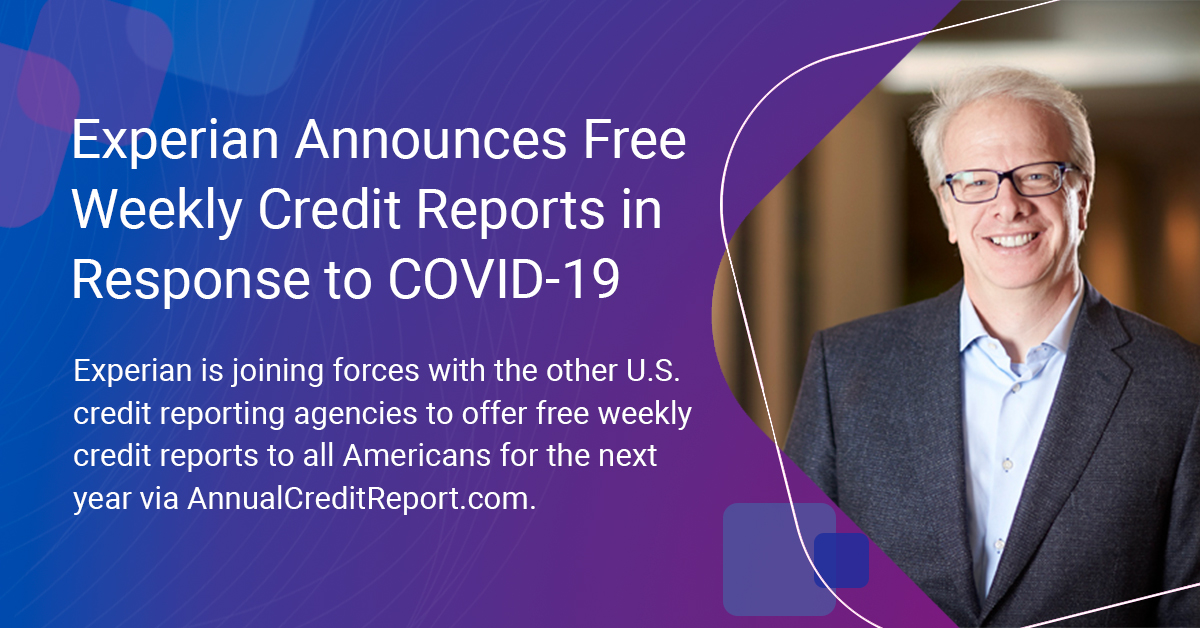All posts by Alex Lintner

In a world that was already becoming increasingly digital, COVID-19 expedited timelines and turned forecasted projects into immediate needs nearly overnight. I’ve seen this play out in my role at Experian as well as across the financial services industry. Experian was recognized as an innovative company prior to the pandemic and the current environment has only accelerated our ability to innovate. As we surpassed the six month mark adjusting to our new normal, I was invited to join Bloomberg’s Future of Finance: Leveraging Digital Transformation for a Virtual World roundtable discussion with Senior Analyst of Bloomberg Intelligence Julia Chariell and leaders from IBM, Ally Financial, Deutsche Bank and others, to share how we are rising to meet the needs of consumers and lenders during the COVID-19 pandemic. You can find a recap of our conversation here and view the full video discussion here. We know each American is facing unique COVID-19-related circumstances, so there is not a one-size-fits-all solution. This notion has carried us as we are rising to meet the needs of our clients and consumers during the pandemic. We must allow individuals who can still meet their financial obligations to have access to credit and ensure lenders can identify them. Maintaining and improving financial access for these consumers will play an important role in our road to economic recovery. To continue to lend responsibly, the financial services industry must carefully examine all aspects of consumer financial capability in near real-time – consumer control and consumer-permissioned data play a key role in achieving this. By leveraging accurate data, I believe we have a chance to lessen the impact of the current U.S. economic crisis, extend credit responsibly, and support the hardest-hit consumers as we adjust to a new world post COVID-19.

With the impact of COVID-19, we’re certainly in uncharted territory. Many people are struggling with high unemployment, which is resulting in missed credit card, utility, and rent payments. In response, Experian is joining forces with the other U.S. credit reporting agencies, to offer free weekly credit reports to all Americans for the next year via AnnualCreditReport.com. A credit report allows people to monitor their finances and better understand their overall financial health. We’re proud our industry is uniting to make this possible for all U.S. consumers starting today. Credit reports are updated constantly, so the ability for an individual to look at their report weekly is helpful to monitor for lender updates and ensure there is no fraudulent or unfamiliar activity. During these difficult times, this is especially important. In addition to the free weekly credit report at AnnualCreditReport.com, Experian also offers consumers free access to their credit report, FICO score, and ongoing credit monitoring at Experian.com. This is a no-charge product. We want to give consumers multiple options to access and manage their credit report. At Experian, we’re committed to enabling fair and responsible lending through the power of our data. As the consumer’s bureau, our goal is to not only help consumers build credit but to get better access to credit. All of us are working diligently every day to keep our data as accurate, relevant, and secure as possible so that lenders can use the data to responsibly extend credit to people who need it most especially when the economy returns to strength. What You Can Do Now The most vital action someone can take if they are unable to pay a bill is to talk with their lender and inquire about assistance programs that may be available. If a consumer receives an accommodation it will have minimal impact on their credit score if their account is in good standing and if there hasn’t been previous delinquencies reported We remain committed to informing, guiding, and protecting people during these unprecedented times. Beyond our offer for free credit reports, we’ve created a dedicated website, with links to multiple resources and materials to help the community learn about credit and other important personal finance topics. We encourage everyone to visit the Experian COVID-19 Resources & Credit Education. Take care and stay healthy.

Whether due to job loss, shortened working hours, or the need to take off time from work to care for ill family members, the current COVID-19 outbreak will undoubtedly cause financial hardship for millions of Americans. Understandably, the current situation is causing some consumers to fear losing something they’ve worked incredibly hard for – their home. For many, a home is the largest purchase they’ll ever make. We spend many years of our lives working to purchase a home and then many years after working to fill it with memories. We understand how important it is for you to protect your home. Thankfully, we’re seeing mortgage lenders, federal associations and the financial industry working together in truly unprecedented ways to help consumers cope with new financial challenges brought on by COVID-19. Last week, the Department of Housing and Urban Development, Fannie Mae and Freddie Mac -- two of the largest mortgage services in the county -- announced they are suspending foreclosures and evictions for at least 60 days. You can read more about this announcement here. This was followed by New York, an area hit particularly hard by COVID-19, urging mortgage servicers to refrain from reporting late payments for 90 days. The order outlines ways lenders can provide support to consumers who are unable to make timely mortgage payments, including forbearing mortgage payments for 90 days from their due dates. As part of this, late payments would not be reported to credit reporting agencies like Experian for 90 days and consumers would not have to pay late or online payment fees. The order also postpones foreclosures and evictions for 90 days and requires lenders to proactively outreach to consumers, through text, email or other means to ensure they’re aware of the assistance that’s being offered. Los Angeles, Miami and other cities across the U.S. are now also halting evictions. This news was shared in conjunction with Bank of America announcing additional support to borrowers, including the option to defer, or essentially pause, mortgage payments during the current outbreak. Many of the largest mortgage lenders in the country are offering the same support to consumers. Please note, the Department of Housing and Urban Development, Fannie Mae and Freddie Mac acted fast, and these are the guidelines as of the time when this article was written. As things are still early, our Experian mortgage team will stay abreast with potential new developments and update this information if or as things will change. These are unprecedented times and we are starting to see lenders and consumers engage in equally unprecedented ways as we work to overcome the new reality we’re all facing. At the same time, we are seeing interesting trends unfold in terms of mortgage lending activity. According to the Mortgage Bankers Association, as of March 25, 2020, these include: Refinancing existing mortgages, which has been booming with interest rates at historically low levels, declined almost 35% compared to the previous week, but is still twice as high as it was the previous year. Not surprisingly, the states with the biggest declines are the states hardest hit by the COVID-19 outbreak (i.e. New York, Washington, and California) In addition, with the economy under pressure, there was a nearly 30% decline in weekly new mortgage applications. If you or someone you know is a homeowner, I hope you found this information useful. Remember, if you are concerned you may miss a mortgage payment, the first and best move you can make, to protect your home and your financial health, is to contact your mortgage lender as soon as possible. Lenders do not want you to miss a payment any more than you do. They can discuss options for navigating these unusual circumstances. Keep in mind, these programs are available to you if you are facing financial hardship due to the COVID-19 crisis, for example, if you lost your job or had to be hospitalized. Of course, we’re all hoping not to be in either of these categories. If you haven’t been financially impacted by the current COVID-19 crisis, you are expected to continue to make your mortgage payments (and meet all your other financial obligations). You should feel good about being able to do that as it will make you part of the important group of individuals who can keep contributing to sustaining the American economy.

Through Experian’s technology and cutting-edge innovations, we’re helping consumers build their credit histories and access affordable, mainstream financial products. We are truly improving consumer’s financial lives in a meaningful way. But, with all the exciting innovations in technology, sometimes, it’s easy to forget the impact we can create in our everyday interactions with people. Let me give you an example. I recently traveled to Nashville, TN for a conference. Since I didn’t know my way around the area, I hired a driver to pick me up and take me to my hotel. As I was heading to the airport exit, I saw a woman holding a sign that read “Experian.” I introduced myself and we both got into the car and headed for the hotel. As we were driving, she asked, “So, do you really work at Experian?” “Here we go…” I thought as I responded, “Yes, I do.” She went on to tell me she was a Desert Storm veteran who faced some real financial hardships that tanked her credit score when she returned home from war. She saw a commercial for Experian Boost, our new tool that allows people to get credit for paying their telecom and utility bills on time. After trying the free tool, her score went up 11 points. This boost got her thinking about other ways she could improve her credit score. I spent the rest of our drive sharing some credit education including the importance improving her debt to income ratio, lowering utilization rates and making on time payments. As we pulled up to my hotel and I got out of the car, she asked if she could give me a hug. “Of course,” I said. I was touched and slightly surprised, to see how much of an effect I had on her. Only, I didn’t realize then just how much of an impact our conversation would truly make on her life. I recently had a chance to reconnect with Renee Preston. She told me about the dramatic changes she’s made since we met that are creating a lasting impact on her financial health. At the time Renee picked me up, she was $56,000 in debt and her credit score was 605. Just a few months after meeting her, Renee put some of the credit education tips I shared with her into practice. Since then, she’s lowered her debt by $36,000 and her credit score has improved by more than 60 points. While Renee knows she still has work to do, she is inspired to continue to improve her financial wellbeing. “I’ve been driving for more than 26 years. I’ve met all kinds of celebrities like Pink and Justin Timberlake. The fact that Alex took the time to talk to a little person like me, it really meant a lot. Since we met, I’ve taken a lot of steps to improve my credit and finances including getting a job with a much higher salary. I truly feel I owe all of these changes to Alex.” Renee Preston, Nashville, TN As a company, we are committed to helping people improve their financial lives. When we talk about being the consumer’s bureau, this is exactly what we mean. I’m so thankful I had the opportunity to meet Renee. I’m inspired to continue to find new ways to improve people’s financial health, both personally and as a leading member of Experian’s team.

I was born and raised in Germany and had the privilege of moving to the U.S. for my undergraduate degree. When I started school, my parents made a deal with me that they would pay one-third of my tuition. I got a job at the campus library to pay another third but still was short by a third. To cover the gap, I decided to try my luck as an entrepreneur. Specifically, the dollar was very strong due to which it seemed feasible to buy a German luxury car in my native Germany, refurbish it to U.S. specs, drive it for a little while and still turn a healthy profit. In order to purchase my first car, I needed a loan. However, like most new immigrants, I was credit invisible. Meaning, the credit history I had in Germany did not come with me to the U.S. Because of this, I was forced to rely on alternative lending as traditional lenders did not have enough information to assess if I was a good credit risk. With no other options, I turned to an alternative lender and secured a high interest loan. Thankfully, I was able to maintain my payments and paid off the loan in fifteen months, that is, when I sold the car. At this time, obtaining credit from an alternative lender was not factored into a traditional credit history. This meant that even though I repaid the loan responsibly, it did not help build my U.S. credit file or my credit score when I was ready to do it all again. This experience is what fuels my passion to maintain Experian’s position as the leader in alternative credit data and improve consumer financial health. We know that a consumer’s traditional lending history for things like credit cards, personal loans, auto loans, and mortgages are a proven method to assess creditworthiness, but sometimes there isn't enough data to score all consumers. Many consumers who are excluded from the traditional credit ecosystem are in fact creditworthy, but due to an international move, divorce or simply a lack of experience with credit, they’re unscorable and or invisible to lenders. Whether you’re new to the country or just getting your financial feet wet, starting to build your credit history can be difficult. If we indeed can play a role in helping consumers live the American dream, I believe it’s our responsibility to do that. The good news is the lending market is in a pivotal state of change and I believe it’s for the better. At Experian, we can now use the responsible payments consumers make to alternative lenders as well as their rental payments, professional licensures, utility and cell phone payments, and, of course, their traditional credit history to help consumers gain access to the financial services they need. We recently announced Experian Lift™ - a new suite of credit score products that combines exclusive traditional credit, alternative credit and trended data assets to create a more holistic picture of consumer creditworthiness. We believe Experian Lift may improve access to credit for more than 40 million credit invisibles. It’s another step in our commitment to helping improve the financial health of consumers everywhere. As you may know, earlier this year, Experian launched Experian Boost – a free and first-of-its-kind financial tool that empowers consumers to add positive telecom and utility payment history directly into their Experian credit file for an opportunity to instantly increase their FICO Score. Through Experian Boost, we’re empowering consumers to play an active role in building their credit histories. And, with Experian Lift, we’re empowering lenders to identify consumers who may otherwise be excluded from the traditional credit ecosystem. Thin file or subprime consumers have typically been viewed as a fringe and stigmatized segment of society. I can speak from personal experience and say this is not the case. With more than 100 million consumers lacking access to fair and affordable credit, we know this is mainstream America and we need to continue to provide solutions. As the consumer’s bureau, our goal is to help consumers and maintain access to credit. We’re proud of our latest innovations and will continue to identify new means to help consumers gain access to the financial services they need.

The real-time economy is all around us. With the swipe of a finger, we can order a car, find a babysitter or make a mortgage payment.

We’re at a critical point in our nation’s history. We need to make a stand and address the root causes of financial instability in this country. I believe the lack of financial education and access to cheaper financial products are two of the key contributors impacting people’s financial health today.

Experian and Finicity are announcing a partnership that promises to transform the consumer and lender experience and bring it into the 21st century. By partnering with Finicity, we are leveraging our combined capabilities – their industry-leading 16,000 connections throughout the financial services field and Experian’s Decisioning as a Service platform, to be the first credit bureau that can digitize the loan asset and income verification steps of the underwriting process for consumers and lenders.

Alternative data opens up doors to financial access for consumers - and Experian has been at the forefront of collecting, using and advocating for the use of alternative data for many years. This topic was explored and analyzed by the Consumer Financial Protection Bureau (CFPB) in a hearing today in Charleston, West Virginia.